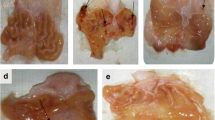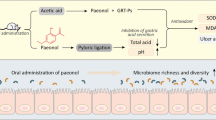Abstract
Nonsteroidal anti-inflammatory drugs delay gastric ulcer healing, and the ability of proton pump inhibitors to counteract this detrimental effect is debated. This study evaluates the effects of pantoprazole on experimental gastric ulcer healing in the presence of indomethacin. Rats with acetic-acid-induced gastric ulcers were orally treated for 3 or 7 days with pantoprazole (15 μmol/kg/day) or famotidine (20 μmol/kg/day), alone or in combination with indomethacin (3 μmol/kg/day). Ulcerated tissues were processed to assess ulcer area, malondialdehyde, proliferating cell nuclear antigen (PCNA) and cleaved caspase-3. Experiments on pylorus-ligated rats indicated that pantoprazole and famotidine were employed at equivalent inhibitory doses on gastric acid secretion (−67.9% and −64.5%, respectively). Indomethacin delayed ulcer healing both at days 3 and 7 (+22 and +35 mm2 vs control ulcer, respectively). At day 3, pantoprazole was more effective than famotidine in promoting ulcer healing in indomethacin-treated animals (−53.6 and −31.6 mm2 vs indomethacin, respectively). Malondialdehyde levels and caspase-3 activation in ulcers were increased by indomethacin (+79% and +3.7 folds vs control ulcer, respectively), and these effects were counteracted by pantoprazole (−77.9% and −3.5 folds vs indomethacin, respectively), but not famotidine. Increments of ulcer PCNA expression (+2.5 folds vs normal) were enhanced further by pantoprazole or famotidine, alone or in combination with indomethacin (+8.6 and +10.3 folds vs normal, respectively). Similar results were obtained after 7-day treatments of ulcerated animals with test drugs. It is concluded that, along with acid suppression, pantoprazole exerts acid-independent effects on ulcer healing, which can be ascribed to a decrease in tissue oxidation and apoptosis.






Similar content being viewed by others
References
Agastya G, West BC, Callahan JM (2000) Omeprazole inhibits phagocytosis and acidification of phagolysosomes of normal human neutrophils in vitro. Immunopharmacol Immunotoxicol 22:357–372
Becker JC, Grosser N, Waltke C, Schulz S, Erdmann K, Domschke W, Schroder H, Pohle T (2006) Beyond gastric acid reduction: proton pump inhibitors induce heme oxygenase-1 in gastric and endothelial cells. Biochem Biophys Res Commun 345:1014–1021
Bianchi Porro G, Lazzaroni M, Imbesi V, Montrone F, Santagada T (2000) Efficacy of pantoprazole in the prevention of peptic ulcers, induced by non-steroidal anti-inflammatory drugs: a prospective, placebo-controlled, double-blind, parallel-group study. Dig Liver Dis 32:201–208
Biswas K, Bandyopadhyay U, Chattopadhyay I, Varadaraj A, Ali E, Banerjee RK (2003) A novel antioxidant and antiapoptotic role of omeprazole to block gastric ulcer through scavenging of hydroxyl radical. J Biol Chem 278:10993–11001
Blandizzi C, Fornai M, Colucci R, Natale G, Lubrano V, Vassalle C, Antonioli L, Lazzeri G, Del Tacca M (2005) Lansoprazole prevents experimental gastric injury induced by non-steroidal anti-inflammatory drugs through a reduction of mucosal oxidative damage. World J Gastroenterol 11:4052–4060
Carvajal A, Arias LH, Vega E, Sánchez JA, Rodríguez IM, Ortega PG, del Pozo JG (2004) Gastroprotection during the administration of non-steroidal anti-inflammatory drugs. A drug-utilization study. Eur J Clin Pharmacol 60:439–444
Das D, Banerjee RK (1993) Effect of stress on the antioxidant enzymes and gastric ulceration. Mol Cell Biochem 125:115–125
Eldrige SR, Butterworth BE, Goldsworthy TL (1993) Proliferating cell nuclear antigen: a marker for hepatocellular proliferation in rodents. Environ Health Perspect 101(Suppl 5):211–218
Ernst H, Konturek PC, Hahn EG, Stosiek HP, Brzozowski T, Konturek SJ (2001) Effect of local injection with basic fibroblast growth factor (bFGF) and neutralizing antibody to bFGF on gastric ulcer healing, gastric secretion, angiogenesis and gastric blood flow. J Physiol Pharmacol 52:377–390
Fiorucci S, Antonelli E, Morelli A (2001) Mechanism of non-steroidal anti-inflammatory drug-gastropathy. Dig Liver Dis 33(Suppl 2):S35–S43
Fisher U, Jaenicke RU, Schulze-Osthoff K (2003) Many cuts to ruin: a comprehensive update of caspase substrates. Cell Death Differ 10:76–100
Fornai M, Natale G, Colucci R, Tuccori M, Carazzina G, Antonioli L, Baldi S, Lubrano V, Abramo A, Blandizzi C, Del Tacca M (2005) Mechanisms of protection by pantoprazole against NSAID-induced gastric mucosal damage. Naunyn-Schmiedeberg’s Arch Pharmacol 372:79–87
Goldstein JL, Miner PB Jr, Schlesinger PK, Liu S, Silberg DG (2006) Intragastric acid control in non-steroidal anti-inflammatory drug users: comparison of esomeprazole, lansoprazole and pantoprazole. Aliment Pharmacol Ther 26:1189–1196
Gudis K, Sakamoto C (2005) The role of cyclooxygenase in gastric mucosal protection. Dig Dis Sci 50 Suppl 1:S16–S23
Hiraishi H, Shimada T, Terano A (2000) Involvement of oxidative stress in the pathogenesis of NSAID-induced gastric mucosal damage. J Gastroenterol 35:567–569
Itoh M, Imai S, Joh T, Yokoyama Y, Yasue N, Iwai A, Matsusako K, Endoh K, Kawai T, Takeuchi T (1990) Effect of epidermal growth factor in combination with sucralfate or omeprazole on the healing of chronic gastric ulcers in the rat. J Clin Gastroenterol 12(Suppl 1):S187–S191
Kinoshita Y, Hassan MS, Kawamura M, Matsushima Y, Okada A, Maekawa T, Fukui H, Waki S, Kishi K, Chiba T (1998) Increased hepatocyte growth factor content in rat stomach during omeprazole treatment. Digestion 59:102–109
Konturek PC, Brzozowski T, Konturek SJ, Pajdo R, Konturek JE, Kwiecień S, Taut A, Hahn EG (1999) Apoptosis in gastric mucosa with stress-induced gastric ulcers. J Physiol Pharmacol 50:211–225
Kwicien S, Brzozowski T, Konturek SJ (2002) Effects of reactive oxygen species action on gastric mucosa in various models of mucosal injury. J Physiol (Paris) 53:39–50
Laine L, Takeuchi K, Tarnawski A (2008) Gastric mucosal defense and cytoprotection: bench to bedside. Gastroenterology 135:41–60
Lazzaroni M, Bianchi Porro G (2001) Prophylaxis and treatment of non-steroidal anti-inflammatory drug-induced upper gastrointestinal side-effects. Dig Liver Dis 33(Suppl 2):S44–S58
Lazzaroni M, Bianchi Porro G (2004) Gastrointestinal side-effects of traditional non-steroidal anti-inflammatory drugs and new formulations. Aliment Pharmacol Ther 20(Suppl 2):48–58
Maity P, Bindu S, Choubey V, Alam A, Mitra K, Goyal M, Dey S, Guha M, Pal C, Bandyopadhyay U (2008) Lansoprazole protects and heals gastric mucosa from NSAID-induced gastropathy by inhibiting mitochondrial as well as Fas-mediated death pathways with concurrent induction of mucosal cell renewal. J Biol Chem 283:14391–14401
Nagano Y, Matsui H, Muramatsu M, Shimokawa O, Shibahara T, Yanaka A, Nakahara A, Matsuzaki Y, Tanaka N, Nakamura Y (2005) Rebamipide significantly inhibits indomethacin-induced mitochondrial damage, lipid peroxidation, and apoptosis in gastric epithelial RGM-1 cells. Dig Dis Sci 50(Suppl 1):S76–S83
Naito Y, Yoshikawa T, Matsuyama K, Nishimura S, Yagi N, Kondo M (1995) Effects of free radical scavengers on indomethacin-induced aggravation of gastric ulcer in rats. Dig Dis Sci 40:2019–2021
Pastoris O, Verri M, Boschi F, Kastsiuchenka O, Balestra B, Pace F, Tonini M, Natale G (2008) Effects of esomeprazole on glutathione levels and mitochondrial oxidative phosphorylation in the gastric mucosa of rats treated with indomethacin. Naunyn-Schmiedeberg’s Arch Pharmacol 378:421–429.
Pérez-Aisa A, Sopeña F, Arceiz E, Ortego J, Sainz R, Lanas A (2003) Effects of exogenous administration of transforming growth factor-beta and famotidine on the healing of duodenal ulcer under impact of indomethacin. Dig Liver Dis 35:397–403
Playford RJ, Marchbank T, Calnan DP, Calam J, Royston P, Batten JJ, Hansen HF (1995) Epidermal growth factor is digested to smaller, less active forms in acidic gastric juice. Gastroenterology 108:92–101
Regula J, Butruk E, Dekkers CP, de Boer SY, Raps D, Simon L, Terjung A, Thomas KB, Lühmann R, Fischer R (2006) Prevention of NSAID-associated gastrointestinal lesions: a comparison study pantoprazole versus omeprazole. Am J Gastroenterol 101:1747–1755
Robinson M (2005) Proton pump inhibitors: update on their role in acid-related gastrointestinal diseases. Int J Clin Pract 59:709–715
Sachs G, Shin JM, Howden CW (2006) Review article: the clinical pharmacology of proton pump inhibitors. Aliment Pharmacol Ther 23(Suppl 2):2–8
Schmassmann A, Peskar BM, Stettler C, Netzer P, Stroff T, Flogerzi B, Halter F (1998) Effects of inhibition of prostaglandin endoperoxide synthase-2 in chronic gastro-intestinal ulcer models in rats. Br J Pharmacol 123:795–804
Shigeta JC, Takahashi S, Okabe S (1998) Role of cyclooxygenase-2 in the healing of gastric ulcers in rats. J Pharmacol Exp Ther 286:1383–1390
Simon WA, Sturm E, Hartmann HJ, Weser U (2006) Hydroxyl radical scavenging reactivity of proton pump inhibitors. Biochem Pharmacol 71:1337–1341
Singh G, Triadafilopoulos G (2005) Appropriate choice of proton pump inhibitor therapy in the prevention and management of NSAID-related gastrointestinal damage. Int J Clin Pract 59:1210–1217
Suzuki H, Hibi T (2005) Novel effects other than antisecretory action and off-label use of proton pump inhibitors. Expert Opin Pharmacother 6:59–67
Szabo S, Vincze A (2000) Growth factors in ulcer healing: lessons from recent studies. J Physiol (Paris) 94:77–81
Tachibana KE, Gonzalez MA, Coleman N (2005) Cell-cycle-dependent regulation of DNA replication and its relevance to cancer pathology. J Pathol 205:123–129
Targownik LE, Metge CJ, Leung S, Chateau DG (2008) The relative efficacies of gastroprotective strategies in chronic users of nonsteroidal anti-inflammatory drugs. Gastroenterology 134:937–944
Tarnawski AS (2005) Cellular and molecular mechanisms of gastrointestinal ulcer healing. Dig Dis Sci 50(Suppl 1):S24–S33
Wallace JL, Devchand PR (2005) Emerging roles for cyclooxygenase-2 in gastrointestinal mucosal defense. Br J Pharmacol 145:275–282
Wandall JH (1992) Effects of omeprazole on neutrophil chemotaxis, superoxide production, degranulation, and translocation of cytochrome b245. Gut 33:617–621
Conflict of interest statement
The authors state that they have no conflict of interest to disclose.
Author information
Authors and Affiliations
Corresponding author
Rights and permissions
About this article
Cite this article
Fornai, M., Colucci, R., Antonioli, L. et al. Effects of pantoprazole on ulcer healing delay associated with NSAID treatment. Naunyn-Schmied Arch Pharmacol 379, 305–313 (2009). https://doi.org/10.1007/s00210-008-0355-y
Received:
Accepted:
Published:
Issue Date:
DOI: https://doi.org/10.1007/s00210-008-0355-y




